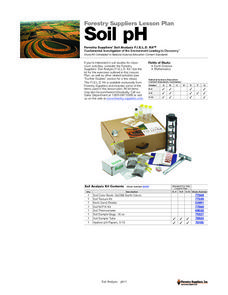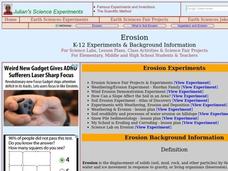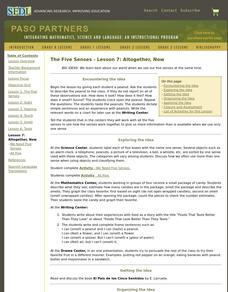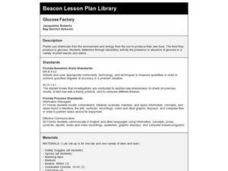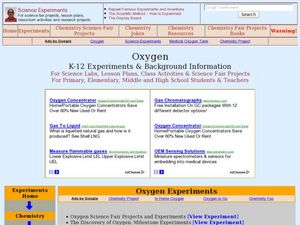Curated OER
Out of the Deep
Learners observe, describe, and record characteristics of ocean animals (mammals and fish) and sea shells. They conduct an experiment comparing and contrasting sugar water, salt water and fresh water and create a mural of coral reef...
Curated OER
Human Needs
Pupils investigate human needs and how they have adapted to different environments. They complete an experiment to discover the effect of stress on muscles. They use the food pyramid to create a plan for healthy eating.
Curated OER
Flavors and Favors
Students conduct a food drive. In this service learning lesson, students put on a school-wide food drive, decorate the bags the food will be delivered in and possibly even help distribute the food.
Curated OER
Mushroom
Students identify the different types of mushrooms. In this biology lesson, students explore different mushroom experiments they can do at home. They discuss ways to extend sliced mushrooms' shelf life.
Curated OER
Sensational Slime
Students predict, observe and draw conclusions while working on an experiment with "slime." Students accurately record observations and draw conclusions about the experiment.
Curated OER
Aztec Floating Gardens
Aztecs created amazing hydroponic gardens called Chinampas, to grow their crops. Learners in grades k-7 engage in four mini-experiments to understand just how amazing floating gardens are. Tip: A perfect way to bring science into your...
Curated OER
Ice Mummies: Frozen in Heaven
Students conduct an experiment to investigate the rate of microbial growth at different temperatures. Students predict what will happen to the food at various temperature and test their hypotheses. Students describe the differences in...
Curated OER
Fracture Fundamentals: A Cheesy Analog
Students make small cuts (fracture nuclei) in processed cheese food and then apply stresses perpendicular or parallel to the cuts to see how fractures grow. They make predictions before each experiment and explain their results to the...
Curated OER
Forestry Suppliers
Students explore the scientific reasons that certain types of foods cause different reactions when they interact with the tongue. They analyze the differences between acids and basics. The experiment is performed at three different sites...
Curated OER
Soggy Seeds
Students conduct experiments to learn about seed germination. In this seed germination lesson, students write a hypothesis for the seed experiment. students complete the experiment for seed germination and graph the data obtained from...
Curated OER
Erosion
Students examine soil erosion and what causes it. In this soil lesson students complete several experiments on soil erosion and the weathering process.
Curated OER
Bubble and Squeak
Students complete a unit on the chemical and technological processes of food preparation. They observe various experiments, describe changes in materials through cooking, identify safety and hygiene issues, and cook various recipes.
Curated OER
Altogether, Now
Pupils apply their five senses to science, math, drama, and writing center activities.
Curated OER
Glucose Factory
Fourth graders determine, through laboratory activity, the presence or absence of glucose in a variety of plant leaves and stems. They work in groups and perform a three part laboratory which shows them how plants convert sunlighht to food.
Curated OER
Investigating Convection Currents
Students examine how differences in the temperature and salinity of the water help create ocean currents. They perform an experiment which shows how temperature affects the circulation of ocean water.
Curated OER
Why Oil and Water Don't Mix
Second graders explore why oil and water do not mix. They make and record their predictions and observe the experiment in which cooking oil is mixed with a glass of water. Students discuss why they think the oil and water did not mix and...
Alabama Learning Exchange
The Water Cycle
Students participate in a hands-on experience with the water cycle. They experience different parts of the water cycle through experiments and exploring the Internet. They create a poster or model of the water cycle and explain each part...
Curated OER
Pond 2: Life in a Drop of Pond Water
Students observe organisms found in pond water with a microscope. In groups, they discuss how single-celled organisms satisfy their needs for food, water and air. They compare and contrast the needs of macroscopic and microscopic...
Curated OER
Recycling
Fourth graders gain an awareness of recycling. In this science lesson plan, 4th graders become aware of how much garbage we can produce, identify landfills and their purposes, and explain how recycling saves energy and resources while...
Curated OER
Rising Air
Young scholars investigate the concept of rising air in the formation of clouds and precipitation. In this rising air lesson, students conduct an experiment with hot and cold water that shows how warm water rises due to thermal buoyancy....
Curated OER
It All Began With a Bean
Students explore human anatomy by participating in hands-on activities. In this digestive system lesson plan, students read the book It All Began With a Bean and discuss the process of food digestion in our body. Students utilize soda...
Curated OER
Oxygen
Students explore oxygen and its physical and chemical propeties. In this investigative lesson students complete several experiments using oxygen.
Curated OER
Yum - Yum!! - The Digestion Lesson
Students explore the various components of the digestive system and learn about both the physical and chemical processes that work together to break down food into absorbable molecules.
Curated OER
Building a Pill Bug Palace
Students make "pets" of isopods (potato bugs) to determine their preferred environment and food sources. They record their results on a bar graph and in a scientific report.










